


Take Action: Tell Congress to Protect Public Land Roadless Areas, Pass RACA
Take Action: Tell Congress to Protect Public Land Roadless Areas, Pass RACA
Tell Congress: Pass the Roadless Area Conservation Act Making Protection Permanent
On June 23rd, Agriculture Secretary Rollins announced that the Trump Administration will end the Roadless Rule, which has protected 58.5 million acres of roadless Forest Service land for 25 years. The Roadless Rule was finalized in 2001 after years of planning and public consultation. Over 600 public meetings were held and 1.6 million public comments were received on the rule, with 97% in favor of protecting the last wild areas in America from roadbuilding and commercial logging.
While most Roadless Areas are in the western US and Alaska, North Carolina is blessed with more public land and wild country than most eastern states. About 15%, or 152,000 acres, of Nantahala and Pisgah National Forests are protected by the Roadless Rule. These areas include well-known and beloved places like Cheoah Bald, South Mills River, Laurel Mountain, the Black Mountains, Tusquitee Bald, and Upper Wilson Creek. Roadless areas provide the best remaining fish and wildlife habitat in the nation, and unique recreational opportunities. Ending the roadless rule is nothing more than a handout to a small group of people that would benefit from logging and mining them.
But what about wildfire risk, some will ask? The truth of the matter is that fire is a crucial part of forest health, and roads bring both more arson fires and more fire suppression. The natural fires that burn in roadless areas maintain and renew the forest and don’t harm communities, which are by definition far from roadless areas. Plus, the Roadless Rule already contains the flexibility to cut trees to reduce wildfire risk and insect outbreaks. The Roadless Rule is working – don’t let oligarchs and bureaucrats take it away!
Fight for Roadless Areas!
Fortunately, The Roadless Area Conservation Act (RACA) has been introduced in the Senate with many co-sponsors. RACA would make the Roadless Rule more durable and end the ability of bureaucrats to remove it with a simple rulemaking process. Contact your Senators and Congressional Representatives today, and ask them to support the Roadless Area Conservation Act and oppose Secretary Rollins’ attempt to end the rule.
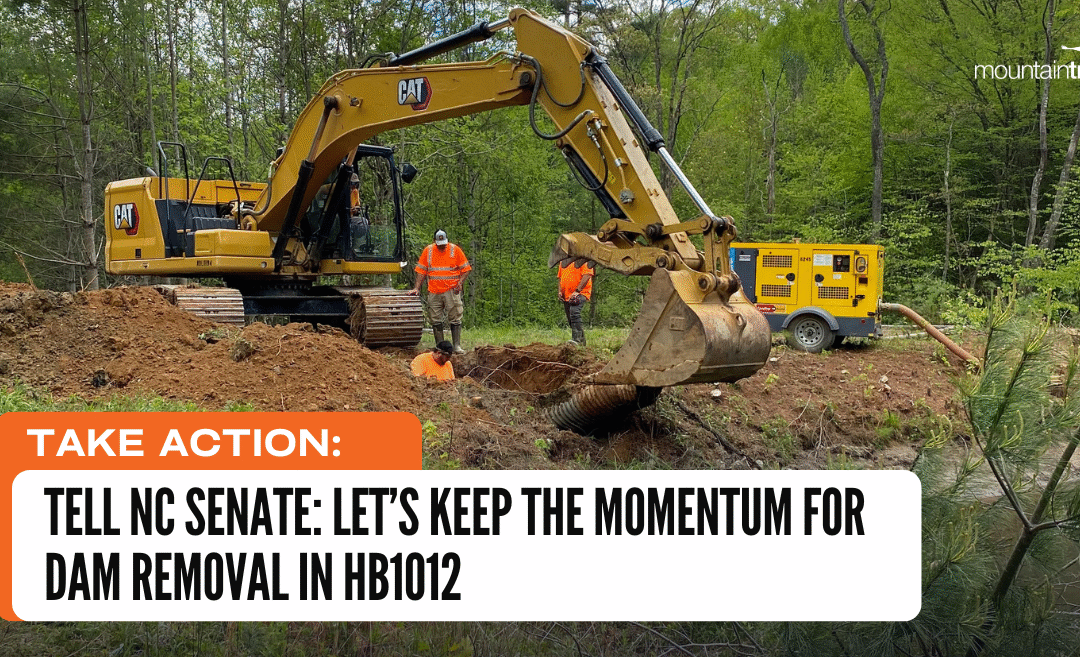
Take Action: Tell NC Senate to Keep Funding for Dam Removal in HB1012 – Disaster Recovery Part II
Take Action: Tell NC Senate to Keep Funding for Dam Removal in HB1012 – Disaster Recovery Part II
Photo: American Rivers, Conservation Trust for North Carolina, MountainTrue, Friends of the Mountains-to-Sea Trail, the NC Wildlife Resources Commission, and the National Park Service (NPS) came together to remove an earthen dam from Cranberry Creek Preserve in the New River watershed this May.
Tell NC Senate: Let’s Keep the Momentum for Dam Removal
We’re grateful to members of the North Carolina House for including funding for dam removal in HB1012. Now it’s up to the Senate to support this investment to help keep our communities safer, restore rivers, and support local jobs and economies.
When Hurricane Helene struck, 41 dams failed or were severely damaged, putting homes, roads, and lives at risk. Hundreds more outdated, unmaintained dams remain across the state—each one a potential hazard.
We’ve already seen the power of dam removal in action. The Shulls Mill Dam, removed in 2024 with state support, helped prevent infrastructure damage during Helene flooding on the Watauga River. Just downstream, the Wards Mill Dam removal protected neighbors and opened up miles of habitat for native species.
Let’s build on that success.
Take a moment to tell Senators to prioritize dam removal funding to continue supporting this life-saving, river-restoring work.
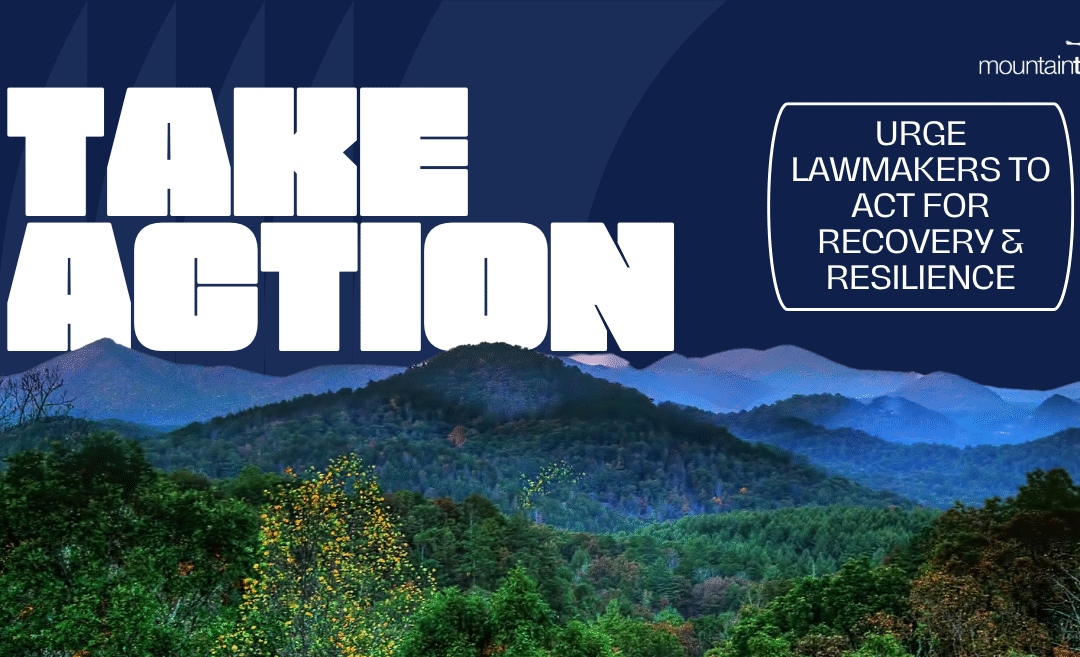
Take Action & Tell NC Lawmakers: Fund Recovery, Remove Dangerous Dams, and Expand Housing Options
Take Action & Tell NC Lawmakers: Fund Recovery, Remove Dangerous Dams, and Expand Housing Options
The NC House has passed a strong disaster recovery package—HB1012—that includes $10 million for dam removal, $60 million for small business relief, and millions more for clean water infrastructure, parks, and storm cleanup. This is the bill our communities need.
At the same time, housing legislation like SB495, which would allow for more low-impact housing by permitting Accessory Dwelling Units (ADUs), is stalled in the General Assembly. These “granny flats” and “in-law suites” help address our housing shortage without paving over forests and farmland.
Use the form below to tell your lawmakers:
- Pass HB1012 without delay.
- Keep dam removal funding in the bill.
- Advance SB495 to expand housing options.
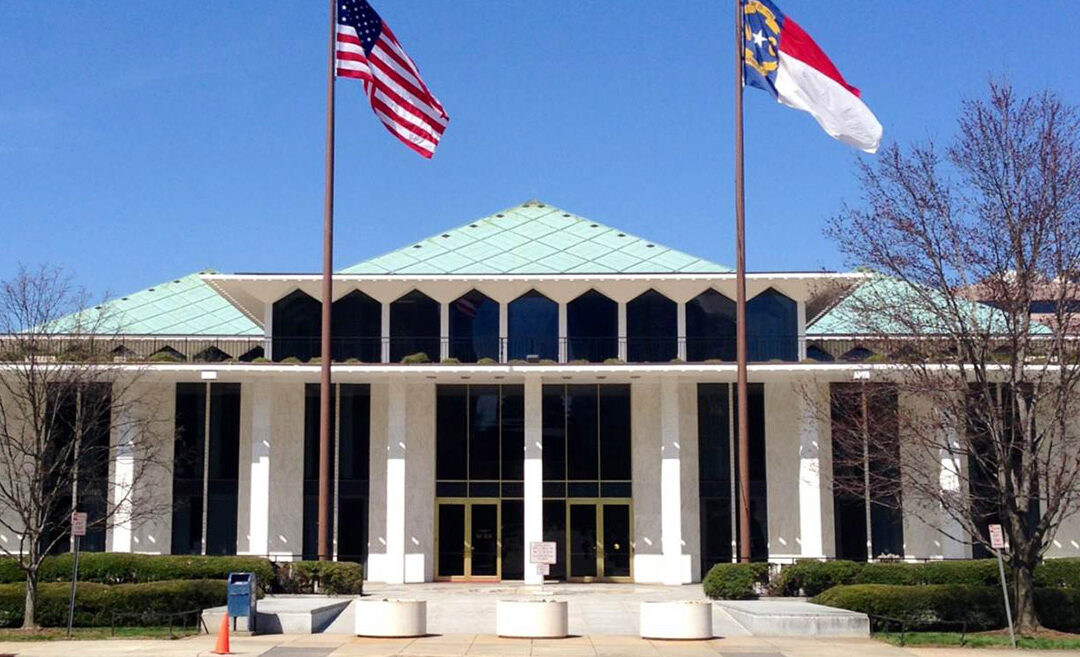
MT Raleigh Report – Legislative Update: Crunch Time in Raleigh: Where Key Bills for WNC Stand
MT Raleigh Report – Legislative Update: Crunch Time in Raleigh: Where Key Bills for WNC Stand
Memorial Day marks the unofficial start of summer—but in Raleigh, it signals something else: the homestretch of the North Carolina General Assembly’s legislative session.
While our legislature doesn’t have a firm end date, the new fiscal year begins on July 1. Republican leaders in both the Senate and House—where the GOP holds majorities—are signaling that they want to finalize a state budget and wrap up the session soon after.
That means the next few weeks will be the most important of the year for shaping North Carolina’s policies and spending priorities. Key decisions are still up in the air, and lawmakers will need to find agreement—or risk dragging the session deep into the summer or leaving town without finalizing a budget, again.
Here’s where things stand—and how they affect Western North Carolina:
Helene Recovery: Progress, But More Work Ahead
The Senate’s proposed budget includes $700 million for disaster recovery following Hurricane Helene—but offers no details on how or when the funds would be used.
Meanwhile, the House has taken a clearer step forward, passing a stand-alone recovery bill—House Bill 1012 (HB1012)—that allocates $464 million in targeted relief, including $60 million for a long-overdue small business loan program, $45 million for water infrastructure and underground storage tank bridge loan programs, $55 million for NC Dept. of Agriculture for wildfire preparedness, streamflow assistance, and other farm assistance, $12.5 million for state and local park cleanup, and $15 million for debris removal unmet needs, among other items.
Thanks to weeks of advocacy by MountainTrue and our supporters, the House bill also includes $10 million for dam removal—a critical investment that would unlock federal funding to remove aging, hazardous dams that pose a serious risk during heavy storms, including the over 40 dams severely damaged in Helene that are now prone to failure. HB1012 now heads to the Senate for consideration.
The Budget Battle
Crafting the state’s two-year budget remains lawmakers’ top task—but it won’t be easy. Budget forecasts show potential deficits in the coming years. While House Republicans want to slow the pace of tax cuts until revenues rebound, Senate Republicans are pushing for faster, deeper tax cuts and dispute the deficit projections.
On Helene recovery, both chambers agree more help is needed—but differ on how to deliver it. The House wants to pass HB1012 on its own, avoiding delays tied to broader budget negotiations. The Senate appears likely to fold the bill into the budget, making it harder for Democrats to oppose—or for Gov. Josh Stein to veto—without jeopardizing critical relief.
Housing: ADUs Can Help Fix the Crisis
One of MountainTrue’s top legislative priorities is promoting housing options that allow us to address our housing shortage without creating sprawl and negatively impacting our natural environment. That’s why we support reforms such as legislation that would require local governments to allow the construction of Accessory Dwelling Units (ADUs)—also known as “granny flats” or in-law suites.
These small homes, often built on lots with existing houses, provide lower-cost, in-fill housing so we can build in and up instead of out into our forests, farms, and open spaces. While several ADU bills have been introduced, they’ve stalled in both chambers. MountainTrue is urging lawmakers to move forward on ADU legislation before the end of the session.
How You Can Help
The decisions made over the next few weeks will shape North Carolina’s future—and your voice matters.
Please contact your state Senator and urge them to:
- Support the dam removal funding in HB1012 to protect communities and leverage federal dollars.
- Pass HB1012 as a stand-alone bill, so critical aid reaches families, small businesses, and local governments without delay.
- Advance SB495 to allow Accessory Dwelling Units, a practical step to increase affordable housing options in our communities.
Thank you for standing with MountainTrue as we fight for a cleaner, healthier, and more resilient Western North Carolina.
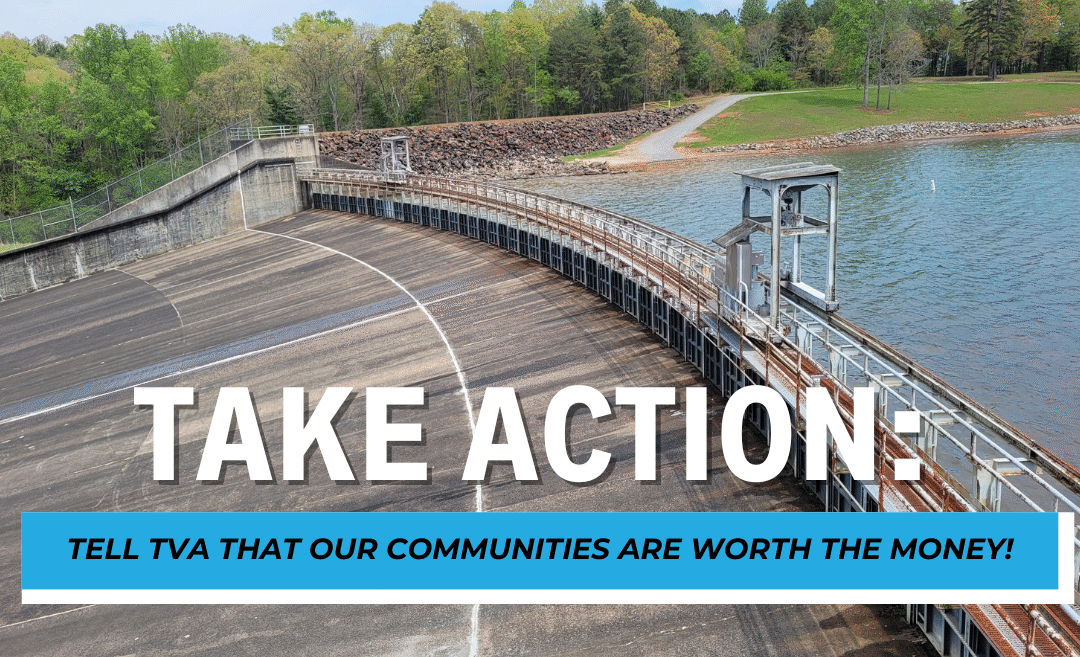
Take Action for Lake Chatuge’s Communities
Take Action for Lake Chatuge’s Communities
Tell TVA that our communities are worth the money
It’s been a rocky two weeks here in the Lake Chatuge watershed since the Tennessee Valley Authority (TVA) published its official public notice about the Chatuge Dam Safety Modifications on April 21, with high levels of fear and anxiety on the part of local residents and business owners. Since MountainTrue’s last Lake Chatuge action alert on April 18, TVA has answered the question about why this project is slated to take so long: the risk to people’s lives downstream is very low. It is up to us now to tell TVA that the risk to people’s livelihoods, both upstream and downstream, is very high! This project must be expedited, and no expense spared to ensure that the level of summertime drawdown is minimized.
Lake Chatuge is unique among the 47 reservoirs TVA owns and manages. In fact, Lake Chatuge is very different from the other five reservoirs in the Southern Blue Ridge in that it’s the lifeblood of Towns County, Georgia. Towns County’s county seat — the City of Hiawassee — is literally “on the lake,” bounded by miles of shoreline on its western side. Also, unlike other mountain reservoirs like Hiwassee, Apalachia, and Fontana, the vast majority of Lake Chatuge’s 132-mile shoreline is privately owned, with many campgrounds, marinas, and tourist lodging. For better or worse, our communities’ economies on both sides of the state line are critically tied to having a relatively full lake during the summer months.
The alternatives that TVA initially proposed all involve deep year-round drawdowns that could last four to six years. The proposed very deep drawdown — up to 10 feet lower in winter and up to 20 feet in summer — could jeopardize the City of Hiawassee’s public drinking water supply system by reducing the volume of water available for use. These levels would also leave marinas and docks on dry ground. And the length of the drawdowns would decimate our tourist economy.
Subsequent discussions with TVA by Sole Commissioner Cliff Bradshaw and Towns County’s U.S. Representative, Andrew Clyde, have revealed another alternative that should be added to the Environmental Impact Study (EIS). It involves modifying Alternative E to include building a cofferdam around the spillway repair area. A cofferdam is an enclosure built within a body of water to create a dry working environment so that the work can be carried out safely. TVA would still build a new gate-controlled concrete chute spillway and rehabilitate the existing spillway. While this proposal will no doubt be the most expensive alternative, MountainTrue believes that the cost to our communities far exceeds the project cost. TVA must consider this action to sustain reasonable summer lake levels!
Even if you have already submitted comments on this project, you can submit more if you have new and different substantive concerns or suggestions to express. You are also encouraged to participate in one of the public meetings being held in early May. Click here for the most updated information about when and where these will be held.
The National Environmental Policy Act (NEPA) requires that TVA also consider social and economic impacts, not just impacts to the lake itself. Tell TVA that the currently proposed alternatives will cost our communities too much and ask that a modified Alternative E be analyzed in the EIS.
Resources: links & diagrams
a) Map/links to all TVA reservoirs: https://lakeinfo.tva.com/web/sites/sites_ie2_map_only.htm
b) Guidelines for writing substantive comments: Citizens’ Guide to NEPA
c) TVA’s Project page: https://www.tva.com/newsroom/regional-mountain-dams-safety-initiative/chatuge-dam-safety-modifications
d) TVA project NEPA timeline:

e) Modified Alternative E:
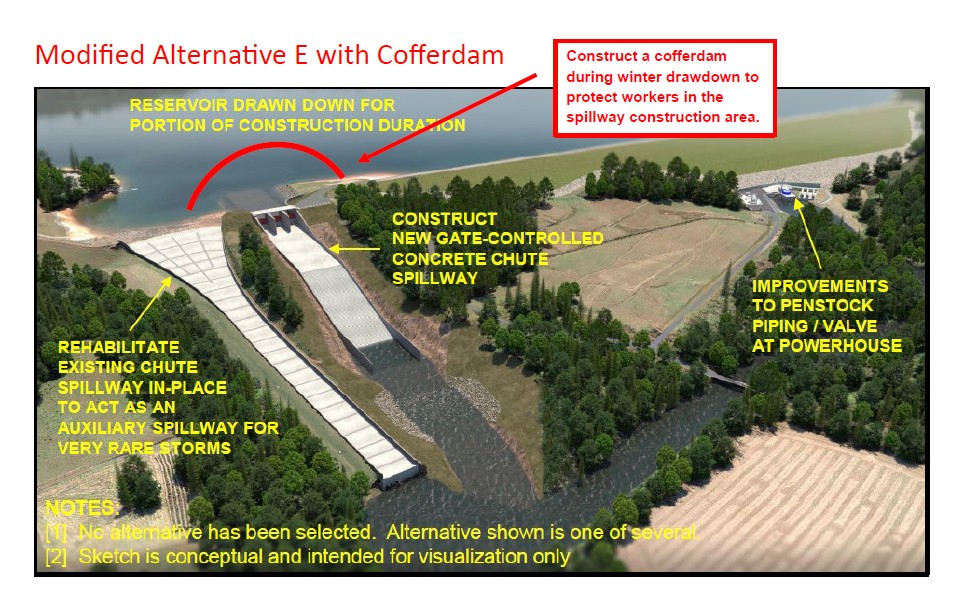
Public Open House Opportunities
Virtual Meeting on May 6, 2025, from 5:30 – 6:30 p.m. ET
Format: Dam Safety and NEPA presenters with a Q&A session. Register here.
May 8, 2025, in Clay County, North Carolina, from 5:30 – 7:30 p.m. ET
Location: Clay County Schools Cafeteria (Behind Hayesville Middle School Gym/adjacent to Hayesville High School) – 205 Yellow Jacket Drive, Hayesville, NC 28904
Format: Informational booths and materials. Access to subject matter experts. No formal presentation.
May 13, 2025, in Towns County, Georgia, from 5:00 – 7:00 p.m. ET
Location: Towns County Recreation Center, 150 Foster Park Rd. Young Harris, GA 30582.
Format: Informational booths and materials. Access to subject matter experts. No formal presentation.
Virtual Meeting on May 15, 2025, from 5:30 – 6:30 p.m. ET
Format: Dam Safety and NEPA presenters with a Q&A session. Register here.
Sample comments:
We welcome you to copy and paste the text below as a basis for your comments, but we also encourage you to personalize your comments to make them unique to you. You can do this by adding a paragraph about why Lake Chatuge is important to you.
Dear TVA,
Lake Chatuge is unique among the many reservoirs your organization operates, even when compared to other mountain reservoirs. It is the lifeblood of Towns County, Georgia. Hiawassee, Georgia, is literally “on the lake,” bounded by miles of shoreline on its western side. Also, the vast majority of Lake Chatuge’s 132-mile shoreline is privately owned, with many campgrounds, marinas, and tourist lodging. Our communities’ economies on both sides of the state line are critically tied to having a relatively full lake during the summer months. While I understand that these repairs are needed, I am concerned that we cannot survive a years-long deep drawdown.
Please consider a modified Alternative E that includes building a cofferdam around the spillway repair area to keep workers safe while allowing for more reasonable summer water levels. While this proposal will no doubt be the most expensive alternative, I believe that the cost to our communities without it justifies the expense.
Other concerns that I have about an extended deep drawdown include:
- Impacts to the City of Hiawassee’s drinking water supply, which not only serves Hiawassee residents and businesses, but a majority of businesses in the Hwy 76 corridor and some around other parts of the lake, as well.
- Impacts to water quality and aquatic life in the lake.
- Impacts to wildlife, including wading birds and waterfowl, as well as threatened and endangered species like bald eagles, bog turtles & green pitcher plants, the latter two of which are found in marshy shallows that could be negatively impacted by an extensive drawdown.
Thank you for the opportunity to comment.
Resources & more info
Links, diagrams & public open house dates + locations
